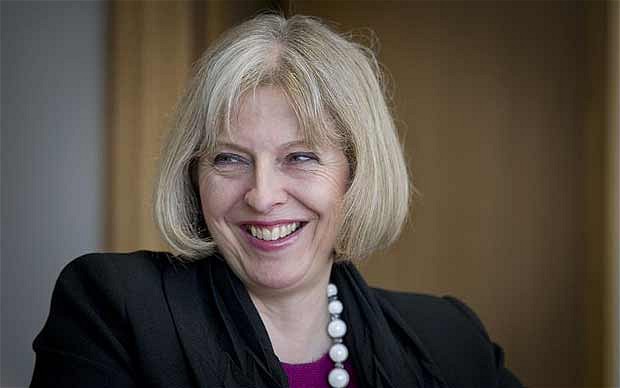Theresa May pledges £2bn a year in science and tech R&D
Industrial Strategy Challenge Fund to back advancements in AI and biotech


Prime Minister Theresa May will spend another 2 billion a year on science and technology research and development in a bid to woo businesses worried about Brexit.
The new Industrial Strategy Challenge Fund aims to ensure British business "remains at the cutting edge of scientific and technological discovery".
At a conference hosted by the Confederation of British Industry, May said that the fund, as part of the strategy, was "not about propping up failing industries or picking winners, but creating the conditions where winners can emerge and grow."
"It is about backing those winners all the way, to encourage them to invest in the long-term future of Britain. And about delivering jobs and economic growth to every community and corner of the country," she said in a speech.
The fund, overseen by government quango UK Research and Innovation, will back projects covering a number of priority technologies and help Britain build on existing strengths in research and development.
The government admitted that despite strengths in science, Britain has until now been relatively weak on commercialisation, meaning that all too often ideas developed in this country end up being commercialised elsewhere.
Now, Whitehall plans to consult on how the fund can best support emerging fields such as robotics and artificial intelligence, industrial biotechnology, medical technology and satellites, where the UK has a proven scientific strength and there is a significant economic opportunity for commercialisation.
Get the ITPro daily newsletter
Sign up today and you will receive a free copy of our Future Focus 2025 report - the leading guidance on AI, cybersecurity and other IT challenges as per 700+ senior executives
The Prime Minister also announced a review of the support for organisations undertaking research through the tax system, looking at the global competitiveness of the UK offer. May added that the Treasury will look at whether the government can make this support even more effective, to ensure the UK "continues to actively encourage innovation".
Tudor Aw, head of technology sector at KPMG UK, said that technology is a key battleground for most economies and the UK must ensure it is a leader in this field.
"The 2 billion R&D fund for emerging tech, such as artificial intelligence and biotech, is therefore hugely encouraging and will make a real difference to the UK being seen as a tech destination of choice for scientists, entrepreneurs, investors and tech companies," he said.
Kit Burden, global co-head of the technology sector at law firm DLA Piper, said that the additional funding will need to be set against the loss of EU grants for our academic institutions.
"Whilst government funding is always helpful, the main drive for British R&D will always come from the private sector. Accordingly, the conditions for the growth will remain in doubt until the terms of Brexit are clearer," he added.
"Success for British R&D is more about talent and people than pure money. Ensuring that the sector can continue to attract and retain the best talent - from both at home and abroad - will be at least as important (if not more so) than any injection of cash of the level now envisaged."
Julian David, CEO of techUK, said the announcement sends out a clear message that the UK is the best place for buisnesses to locate.
He said: "Tech companies will react very positively to the Prime Minister's commitment to backing tech and innovation to create winners right across the UK economy. Theresa May is absolutely right to focus on the need to drive up R&D investment in the UK something that techUK has repeatedly called for. She is also right to focus on big transformational technologies being driven by techUK members such as robotics, artificial intelligence and quantum technologies all areas were the UK can lead the world.
"Access to talent at every level is vital for the tech sector. We have to invest in our own talent pipeline and attract the brightest and the best from around the world. The Prime Minister is right that more must be done to boost STEM skills and technical education. But we also prize creativity so it would be good to hear the PM talking about a more rounded STEAM that recognises the importance of the arts."
Rene Millman is a freelance writer and broadcaster who covers cybersecurity, AI, IoT, and the cloud. He also works as a contributing analyst at GigaOm and has previously worked as an analyst for Gartner covering the infrastructure market. He has made numerous television appearances to give his views and expertise on technology trends and companies that affect and shape our lives. You can follow Rene Millman on Twitter.
-
 Cleo attack victim list grows as Hertz confirms customer data stolen
Cleo attack victim list grows as Hertz confirms customer data stolenNews Hertz has confirmed it suffered a data breach as a result of the Cleo zero-day vulnerability in late 2024, with the car rental giant warning that customer data was stolen.
By Ross Kelly
-
 Lateral moves in tech: Why leaders should support employee mobility
Lateral moves in tech: Why leaders should support employee mobilityIn-depth Encouraging staff to switch roles can have long-term benefits for skills in the tech sector
By Keri Allan
-
 Non voyage: Coronavirus, Brexit and the future of business travel
Non voyage: Coronavirus, Brexit and the future of business travelIn-depth The current pandemic and the UK’s impending departure from the EU could have grave consequences for corporate travel
By Carly Page
-
 The IT Pro Podcast: Beyond Brexit
The IT Pro Podcast: Beyond BrexitIT Pro Podcast The UK has officially left the EU, so what happens now?
By IT Pro
-
 Brexit 'could damage' UK tech firm valuations
Brexit 'could damage' UK tech firm valuationsNews However, report finds M&A will be buoyant over the next 12 months
By Clare Hopping
-
 Brexit vote ‘has disrupted UK IT spending’
Brexit vote ‘has disrupted UK IT spending’News Uncertainty caused by referendum has made firms hesitant to make IT investments
By Jane McCallion
-
 Brexit uncertainty causes drop in foreign tech workers
Brexit uncertainty causes drop in foreign tech workersNews New report by Hired shows EU tech workers are worried about their jobs
By Zach Marzouk
-
 Snapchat is set to open a London office
Snapchat is set to open a London officeNews Parent company Snap eschews Ireland tax rates enjoyed by Facebook and Google
By Dale Walker
-
 Fujitsu execs outline Brexit concerns
Fujitsu execs outline Brexit concernsNews Fujitsu executives say they are looking for specific outcomes in a potential Brexit deal
By Thomas McMullan
-
 Silicon Valley wants California to leave the USA after Trump win
Silicon Valley wants California to leave the USA after Trump winNews Super Califrexit thinks The Donald is atrocious
By Adam Shepherd